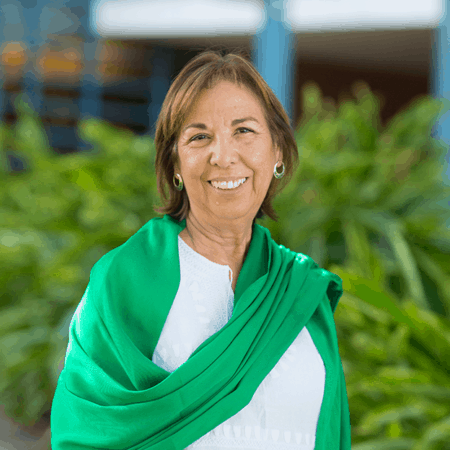Case Study: Why I’m a Folklorist

In this short video, folklorist Norma Elia Cantú explains why she is a folklorist. “I believe in the human spirit, and I believe the work we do nurtures that spirit.” Norma explains why it’s so important to proclaim the name folklorist in the work she does and the roles she is in.
I call myself an undocumented folklorist because like many others in the field, my academic credentials are not in folklore but in English, specifically American Literature. Although I’ve done folklore work for almost 50 years ever since I helped edit a collection of children’s folklore with two of my undergraduate professors, I didn’t call myself a folklorist. I suppose it is in my nature not to use labels; it takes a while to own up to labels. I resisted calling myself a writer or a poet, although I had been publishing fiction and poetry for a while.
As an undergraduate in 1973, I helped my professors with local arrangements for the Texas Folklore Society meeting in my hometown of Laredo, Texas. Thinking back to that meeting in Laredo, I didn’t feel I belonged because the presentations were all about Anglo tales or songs. But the next year, Orlan Sawey Chair of the English Department at Texas A&I, Kingsville was the President of the TFS, and I was an MA student in his class on the Literature of the Cattle Range Industry, which come to think of it, was nothing but a class on cowboy folklore! He hosted a meeting in Kingsville, Texas where I was invited to participate by my mentor Dr. F. Alan Briggs who also didn’t have a degree in folklore but researched traditional cultural expressions. In that small gathering in Kingsville, I spoke about making tortillas, flour tortillas!—a subject I knew well as the oldest of 11 siblings in a family in South Texas in the 50s and 60s. I was fascinated. I could do scholarly work on my own traditional practices! So, when I chose the pastorela, a traditional Christmas shepherds’ play for my dissertation work, I knew I was a folklorist, although my study was a semiotic analysis, unlike any of the folklore studies I was reading, so I hesitated to use the title “folklorist.”
In 1987, back in Laredo and teaching at the local university, I conducted field work and assisted the “real” folklorists from Austin who were identifying the traditional artists they would take to Washington, DC for the Smithsonian American Folklife Festival. When I was invited to come along, I felt that I had found my people. Of course, I knew of the work of Dobie and of Paredes, but I had never felt that I belonged. I also had been helping our university select traditional artists—quilters, dancers, singers, etc.—for the annual folklife festival that the University hosted over the July fourth weekend. The fact that what I was doing was folklore crossed my mind, but I was still reluctant to claim the title. Several years later, I was invited to contribute to an anthology of Texas foodways; I wrote about capirotada, the Lenten food delicacy that has been in my family for generations and finally, I saw that my work on traditional cultural expressions like the matachines, and Chicana rites of passage was folklore. I would often insert research projects on local traditions into writing assignments, and I had my students conduct fieldwork and surveys, although the classes I taught were not in folklore but in linguistics, children’s literature, and in American literature. I can’t claim that there was one epiphanous event that convinced me I was a folklorist; I grew into the label, slowly as one grows into an older sibling’s hand-me down, by doing, by teaching, and most of all by researching and writing about the traditional knowledge of the people in my community, the ways of the folk.
So, yes, I am a folklorist and proud of the work I have done for almost 50 years to document and analyze the traditional practices of my community. I finally joined the AFS in the early 1990s when I attended the centennial celebration at the American Folklife Festival in 1992. I immersed myself in the Society as an active member presenting papers, moderating panels, as a convenor of the Folklore Latino, Latinoamericano y Caribeño Section, the co-creator of the Chicana/o Section, and co-chair of the CDC. I am a folklorist, and I claim that identity publicly and proudly. It is important to let others know that what we do is valuable. I truly believe that being a folklorist means doing what Anzaldúa would call “work that matters,” that our work honors our ancestors and creates a better world for those that come after us.
Despite our best efforts, we do sometimes make mistakes and are happy to correct any errors that you may come across on our site. Should you find an error, please submit one via the “submit a correction” link.